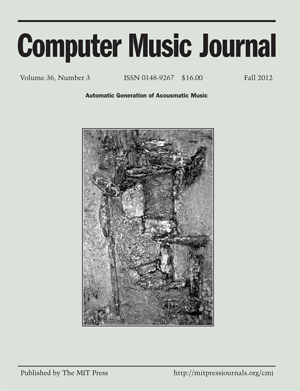
We are excited to announce a call for full length papers for a special issue of Computer Music Journal, with a deadline of 21st January 2013, for publication in Spring of the following year. The issue will be guest edited by Alex McLean, Julian Rohrhuber and Nick Collins, and will address themes surrounding live coding practice.
Live coding focuses on a computer musician’s relationship with their computer. It includes programming a computer as an explicit onstage act, as a musical prototyping tool with immediate feedback, and also as a method of collaborative programming. Live coding’s tension between immediacy and indirectness brings about a mediating role for computer language within musical interaction. At the same time, it implies the rewriting of algorithms, as descriptions which concern the future; live coding may well be the missing link between composition and improvisation. The proliferation of interpreted and just-in-time compiled languages for music and the increasing computer literacy of artists has made such programming interactions a new hotbed of musical practice and theory. Many musicians have begun to design their own particular representational extensions to existing general-purpose languages, or even to design their own live coding languages from scratch. They have also brought fresh energy to visual programming language design, and new insights to interactive computation, pushing at the boundaries through practice-based research. Live coding also extends out beyond pure music and sound to the general digital arts, including audiovisual systems, linked by shared abstractions.
2014 happens to be the ten-year anniversary of the live coding organisation TOPLAP (http://toplap.org). However, we do not wish to restrict the remit of the issue to this, and we encourage submissions across a sweep of emerging practices in computer music performance, creation, and theory. Live coding research is more broadly about grounding computation at the verge of human experience, so that work from computer system design to exposition of live coding concert work is equally eligible.
Topic suggestions include, but are not limited by:
- Programming as a new form of musical exploration
- Embodiment and linguistic abstraction
- Symbology in music interaction
- Uniting liveness and abstraction in live music
- Bricolage programming in music composition
- Human-Computer Interaction study of live coding
- The psychology of computer music programming
- Measuring live coding and metrics for live performance
- The live coding audience, or live coding without audience
- Visual programming environments for music
- Alternative models of computation in music
- Representing time in interactive programming
- Representing and manipulating history in live performance
- Freedoms, constraints and affordances in live coding environments
Authors should follow all CMJ author guidelines (http://www.mitpressjournals.org/page/sub/comj), paying particular attention to the maximum length of 25 double-spaced pages. Submissions which meet an initial quality threshold and address the theme will be subject to in-depth, double-blind peer review. We are very happy to discuss your work and its relevance to the theme prior to submission.
Timetable:
- Paper deadline: 21st January 2013
- Notification of acceptance: 1st April 2013
- Submission of revised papers: 1st July 2013
- Publication: Spring 2014
All submissions and queries should be addressed to Alex McLean <alex.mclean@icsrim.org.uk>
